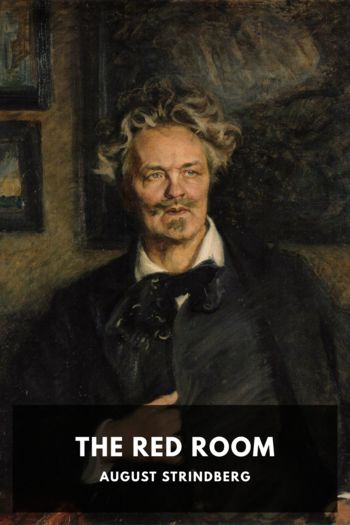The Red Room August Strindberg (best english novels to read txt) 📖

- Author: August Strindberg
Book online «The Red Room August Strindberg (best english novels to read txt) 📖». Author August Strindberg
He dropped his wreath into the little grave and covered his head. Struve took a few steps towards him, seized his hand, and shook it warmly; tears rolled down his cheeks, and he begged Levi for the loan of his handkerchief. Borg, after throwing his wreath into the grave, turned to go, and the others followed slowly.
Falk stood gazing into the open grave, plunged in deep thought. At first he saw only a square of darkness; but gradually a bright spot appeared which grew and took shape; it looked like a disc and shone with the whiteness of a mirror—it was the blank shield on which the life of the child should have been recorded. It gleamed brightly in the darkness, reflecting the unbroken daylight. He dropped his wreath. There was a faint, dull thud, and the light went out. He turned and followed the others.
Arrived at the coach, there was a brief discussion. Borg cut it short.
“To the Restaurant Norrbacka!” he said, briefly.
A few minutes later the party was standing in the large room on the first floor; they were received by a girl whom Borg embraced and kissed; this done, he pushed his hat underneath the sofa, commanded Levi to help him off with his overcoat, and ordered a quart of punch, twenty-five cigars, half a pint of brandy, and a sugar-loaf. Finally he took off his coat and sat down in shirt sleeves on the only sofa in the room.
Struve’s face beamed when he saw the preparations for an orgy, and he shouted for music. Levi went to the piano and strummed a waltz, while Struve put his arm into Falk’s and walked with him up and down the room. He touched lightly on life in general, on grief and joy, the inconstant nature of man, and so on, all of which went to prove that it was a sin to mourn what the gods—he said gods, because he had already said sin and did not wish to be taken for a pietist—had given and taken.
This reflection was apparently made by way of an introduction to the waltz which he immediately after danced with the girl who brought the bowl.
Borg filled the glasses, called Levi, nodded towards a glass, and said:
“Let’s drink to our brotherly love now; later on we can be as rude as we like.”
Levi expressed his appreciation of the honour.
“Your health, Isaac!” said Borg.
“My name’s not Isaac!”
“What the dickens do I care what your name is? I call you Isaac, my Isaac.”
“You’re a jolly devil. …”
“Devil! Shame on you, Jew!”
“We were going to be as rude as we liked. …”
“We? I was, as far as you are concerned!”
Struve thought he had better interfere.
“Thank you, brother Levi, for your beautiful words,” he said. “What prayer was that?”
“Our funeral prayer!”
“It was beautiful!”
“Nothing but empty words,” interposed Borg. “The infidel dog prayed only for Israel; therefore the prayer couldn’t have been meant for the child.”
“All those who are not baptized are looked upon as belonging to Israel,” replied Levi.
“And then you attacked baptism,” continued Borg. “I don’t allow anybody to attack baptism—we can do that ourselves. And furthermore you attacked the doctrine of justification by faith. Leave it alone in future; I don’t permit any outsiders to attack our religion.”
“Borg’s right there,” said Struve; “we should draw the line at attacking either baptism or any other of the sacred truths; and I must beg of you not to indulge in any frivolous discussion of these things tonight.”
“You must beg of us?” sneered Borg. “Must you really? All right! I’ll forgive you if you’ll hold your tongue. Play something, Isaac! Music! Why is music mute at Caesar’s feast? Music! But none of your old chestnuts! Play something new!”
Levi went to the piano, and played the overture to The Mute.
“Now, let’s talk,” said Borg. “You are looking depressed, Mr. Falk; have a glass with me.”
Falk, who felt a certain embarrassment in Borg’s company, accepted the offer with mental reservations. But conversation languished, everybody seemed to dread a collision.
Struve fluttered about like a moth in search of pleasure, but unable to find it he again and again returned to the punch-table; every now and then he danced a few steps, to keep up the fiction that the meeting was merry and festive; but this was not the case by any means.
Levi seesawed between piano and punch. He attempted to sing a cheerful song, but it was so stale that nobody would listen to it.
Borg talked at the top of his voice, “in order to raise his spirits,” as he said, but the party grew more and more silent, one might almost have said uneasy.
Falk paced up and down the room, taciturn, portentous like a thundercloud.
At Borg’s order a tremendous supper, a sexa was served. The convives took their seats amidst ominous silence. Struve and Borg drank immoderate quantities of brandy; in the face of the latter red spots appeared here and there, and the white of the eyes looked yellow. But Struve resembled a varnished Edam cheese; he was uniformly red and greasy. Beside them Falk and Levi looked like children, eating their last supper in the society of giants.
Borg looked at Levi. “Hand the salmon to the scandalmonger,” he commanded, in order to break the monotonous silence.
Levi handed the dish to Struve. The latter pushed his spectacles on to his forehead and spat venom.
“Shame on you, Jew,” he foamed, throwing his dinner-napkin in Levi’s face.
Borg laid a heavy hand on Struve’s bald pate.
“Silence,





Comments (0)